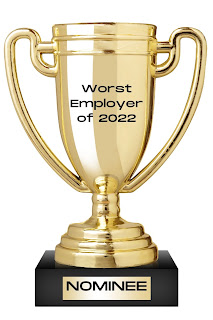I can't do these truly awful allegations of systemic racism, racist harassment, and retaliation any more justice than the actual allegations from the lawsuit that the California Department of Fair Employment and Housing just filed against Tesla.
They are the worst allegations of workplace racism I've ever encountered. They start with claims of a segregated workplace with the Black section referred to as the "porch monkey station," the "slaveship," and the "plantation," and go downhill from there to include daily utterances of every kind of racist slur (including the n-word, "porch monkey," and "coon") 50 - 100 times per day.
Here are the actual allegations, taken from the complaint.
- Because the factory was racially segregated, Defendants' workers referred to the areas where many Black and/or African Americans worked as the "porch monkey station." Defendants' workers with tattoos of the Confederate flag made their racially incendiary tattoos visible to intimidate Black and/or African American workers. Additionally, Defendants' workers referred to the Tesla factory as the "slaveship" or "the plantation,' where Defendants' production leads "crack[ed] the whip." Many Black and/or African American workers understood these terms to be references to how Defendants treated its Black and/or African American workers. One Black worker heard these racial slurs as often as 50-100 times a day.
- Throughout the day, every day, Black and/or African American workers heard Defendants' workers, leads, supervisors, and managers make racial slurs and comments about Black workers. Examples of the racist language include the n-word, "porch monkey," "monkey toes," "boy," "hood rats," and "horse hair." Defendants' workers, including production leads and supervisors, made references to Black and/or African Americans in racist comments and racist jokes such as "N[ ] word out of the hood," "from the ghetto," "Tesla [was] hiring lazy coons," and "go back to Africa."
- These workers were subjected to Defendants' production associates, leads, and supervisors directly calling them the n-word throughout the day. One worker heard Defendants' production associates and leads tell her to "Shut the fuck up, N[ ]," and "All blacks look alike." Another Black worker reported that at least twice Defendants' workers mocked him for eating watermelon during lunch. They accused him of being lazy, saying, "You're eating watermelon, that's why you're lazy." These co-workers also speculated about his genitals and referred to him as "Mandingo" or "big black guy." Another worker heard Defendants' production lead and production associate crack racist jokes loud.
- On a daily basis, Black and/or African American workers were confronted with racist writing while working at Tesla. They saw racist graffiti – including "N[ ]," "KKK," swastikas, the Confederate flag, a white supremacist skull, "go back to Africa," and "mayate" – written on the restroom walls, restroom stalls, lockers, workplace benches, workstations, lunch tables, and the break room. These slurs were even etched onto Defendants' machinery. One Black worker observed "hang N[ ]" penned next to a drawing of a noose in the breakroom restroom. This worker also saw "all monkeys work outside" and "fuck N[ ]" on the breakroom walls. These racial slurs and racial comments, apparent to all who walked by, were left up for months, without Defendants bothering to remove them.
- Black and/or African American workers reported being assigned to the most physically demanding posts in the Tesla factories, compared to non-Black workers who were given more technical, less physical jobs. One worker witnessed only Black and/or African American workers cleaning the factory floor on their hands and knees. No other groups of workers had to do the same. Another worker heard Defendants' workers complain about the heavy workload and how they "need[ed] to get some [B]lacks on this line," suggesting that Black and/or African American workers can and should be doing the difficult menial jobs. One Black worker started as a production lead when he came through a staffing agency, but after he introduced himself to his white manager, he was demoted on the same day to a production associate. His supervisor told him that Defendants' manager thought he was "better suited" in the more labor-intensive position. This worker also applied for a transfer to Tesla's Lathrop factory, only to be told by his manager not to "get [his] hopes up." However, a white co-worker was granted the same transfer.
- Management retaliated against Black and/or African American workers for complaining. Complainants were denied bonuses, promotions, and other professional opportunities. They were falsely accused of being late, unjustifiably written up, denied transfers, assigned to physically strenuous posts or undesirable locations, constructively discharged, or terminated. For those who needed a reasonable accommodation, their requests for a reasonable accommodation were denied in retaliation. As a consequence, many Black and/or African American workers aggravated their injuries or disabilities
- Defendants ignored, immediately dismissed, or perfunctorily investigated and then dismissed workers' complaints. Investigations were inconsistently completed, with different investigators asking vastly varying questions, with different levels of detail and analysis, and sometimes coming to opposite conclusions. Investigations took months to complete. For example, an investigation of a race complaint, where only one witness was interviewed, took close to six (6) months to complete. human resources staff were also not well-trained in analyzing race complaints. For example, one human resources investigator concluded that "banana boy" was simply a "nickname," not a racial slur, even though the Black complainant perceived it to be racist and the harasser had been coached previously on his condescending communication style. In another case, Defendants' human resources investigators determined that a claim of harassment was unsubstantiated because there was no witness corroboration, even though the harasser had admitted to saying a racial slur. Workers, whom Defendants concluded had indeed harassed Black workers and were previously disciplined for similar offenses, remained employed and even were promoted because they were "good performers."

